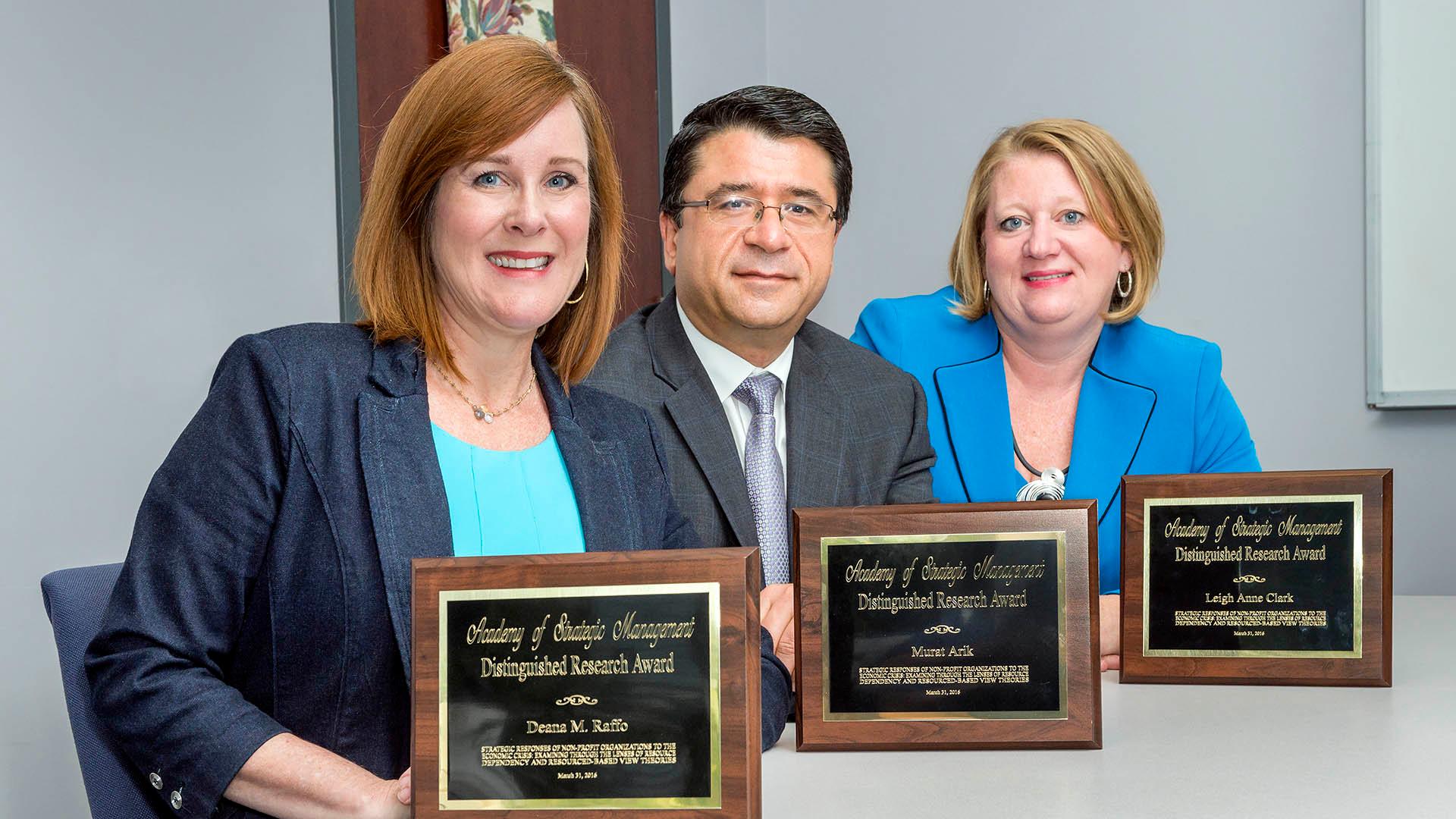
Management and Leadership
Develop your skills in leading, strategizing, change, and self awareness - always be in demand.
Management and Leadership, B.B.A.
The B.B.A. in Management and Leadership degree develops students' skills in leading others, leading strategically, and leading change while also increasing self-awareness to be stronger organizational members and leaders whenever those opportunities occur. The best leaders allocate resources to match the organization's mission and values, empower their employees, develop skills in others, and inspire a shared vision. They make things happen by asking questions, encouraging critical thinking, and motivating the team to discover solutions. The best managers are leaders who manage resources and challenge others to achieve and grow.
Graduates who are competent in relationship building, soft skills, and leadership are in high demand. The workforce is rapidly changing with technological advances and artificial intelligence augmenting workers' tasks. Today, managers and workers must rely on their soft and leadership skills to engage others regardless of their position. We all find ourselves as leaders at different times in our lives, and this program is designed to address the call of employers for graduates who can make things happen in this new environment.
Students interested in careers in management and leadership will complete core classes in leadership skills, human resources management, organization behavior, managing key performance indicators, and ethical leadership as a foundation for the major. Students may choose from a list of electives to gain skills in leading change/innovation, leading organizations/teams, global mindset, and decision-making/problem-solving.
News Briefs

MTSU ‘Out of the Blue’ highlights reimagined management and leadership major [+VIDEO]
How faculty in the Jennings A. Jones College of Business have reimagined the college’s management and leadership major is spotlighted in the July edition of MTSU’s “Out of the Blue” television magazine program. Leigh Anne Clark, a professor in the Department of Management, discussed the revamped major during an interview with program host Andrew Oppmann, vice president of marketing and communications. You can [ Read More ]

July ‘Out of the Blue’ is ready for dual enrollment, CUSTOMS-izing orientation, linking management and leadership
The July 2023 edition of Middle Tennessee State University‘s “Out of the Blue” TV magazine show is keeping summer hot with news about our growing Dual Enrollment Program with students at area high schools, how we welcome and prepare new freshmen and transfer students, and why we’re expanding to meet both industries’ and students’ demand [ Read More ]
News Briefs

MTSU ‘Out of the Blue’ highlights reimagined management and leadership major [+VIDEO]
How faculty in the Jennings A. Jones College of Business have reimagined the college’s management and leadership major is spotlighted in the July edition of MTSU’s “Out of the Blue” television magazine program. Leigh Anne Clark, a professor in the Department of Management, discussed the revamped major during an interview with program host Andrew Oppmann, vice president of marketing and communications. You can [ Read More ]

July ‘Out of the Blue’ is ready for dual enrollment, CUSTOMS-izing orientation, linking management and leadership
The July 2023 edition of Middle Tennessee State University‘s “Out of the Blue” TV magazine show is keeping summer hot with news about our growing Dual Enrollment Program with students at area high schools, how we welcome and prepare new freshmen and transfer students, and why we’re expanding to meet both industries’ and students’ demand [ Read More ]
Related Media

Management and Leadership, B.B.A.
The Management and Leadership degree program at MTSU provides the foundation to seek careers in a variety of fields as leadership and soft skills are in high demand in many disciplines. This major allows you to consider any career that describes managing, leading, or developing others or that includes the “manager” or “leader or lead” in their descriptions. It also provides great flexibility for shifting careers as these skills remain in high demand because of the need to manage people, services, or processes. Examples include:
- Business Consultant or Management Analyst
- Project Manager or Coordinator
- Client Services Manager
- Medical or Health Service Manager
- Retail Manager
- Sales Manager
- Financial Manager
- Human Resources Manager
- Business or General Manager or Executive
- Community Manager
- Nonprofit Manager or Leader
- Leadership Coaching/Training/Development
- Marketing Manager
- Logistics Manager
- Account Executive
- Administrator in Local, State, Federal Government
- Development Director
- Director of Operations
Employers of Management and Leadership degree alumni
- ALDI Inc. (offers management training program)
- ALKU consultants
- Cardinal Health
- Chick-fil-A (offers a management training program)
- Coca-Cola Consolidated Inc.
- Consolidated Electrical Distributors, Inc.
- Dell, Inc.
- Dollar General (offers management training program)
- Enterprise Holdings (offers a management training program)
- Hershey Chocolate Company
- Internal Data Resources
- Jackson National Life
- Kroger
- PepsiCo
- Schneider Electric
- State of Tennessee
- Tennessee Valley Authority (TVA)
- UBS
- UPS
- Walgreens

MTSU’s Career Development Center
MTSU offers a comprehensive Career Development Center that serves students throughout the full student experience and beyond. They collaborate with faculty and staff to equip students with the tools to be marketable to the world of work and continuing education.
Students can schedule an appointment or check online resources and job boards at mtsu.edu/career.
Students can find current internship opportunities by talking to faculty and visiting the University job and internship board called Handshake.
Wondering what you can do with your major? Check out our What Can I Do with A Major In guides.



Managers make things happen! They allocate resources, empower their employees, develop skills in others, and lead the organization. They make things happen by asking questions, encouraging critical thinking, and motivating the team to discover solutions. The best managers are leaders who manage resources and challenge others to achieve and grow.

CONTACT US















